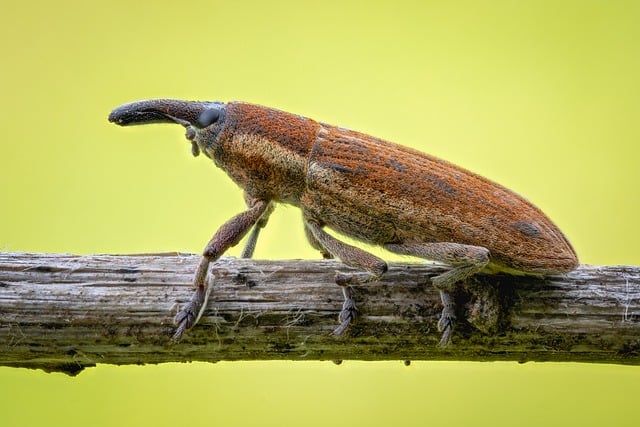Grain weevils, tiny beetles that bore into packaging, pose a significant threat to stored foods in homes and businesses. Their rapid breeding in warm, humid conditions with poor ventilation or unsanitary practices can lead to substantial financial losses and disruption. Effective grain weevil infestation treatment combines sanitation, physical exclusion, and professional application of targeted pesticides. Regular inspections, maintenance, and tailored strategies based on facility architecture and storage methods are key to prevention and successful management. For commercial settings, comprehensive inspections and integrated pest management (IPM) are employed, while residential treatments focus on minimal disruption using safe products and regular sanitization. Preventing infestations is cost-effective through cleanliness, proper food storage, sealing entry points, and regular professional inspections.
Grain weevils can cause significant damage to stored grains, posing a major problem for both residential and commercial properties. This article provides tailored solutions for effective grain weevil infestation treatment, focusing on understanding these pests’ behavior, assessing your facility, implementing preventative measures, and exploring targeted treatment strategies. By following these comprehensive steps, you can secure your environment against future infestations and protect your valuable resources.
Understanding Grain Weevils: Behavior and Impact on Storage
Grain weevils are a common storage pest, capable of infesting both residential and commercial grains, nuts, and dried goods. Understanding their behavior is crucial for effective grain weevil infestation treatment. These small beetles, often less than 1/8th of an inch long, breed rapidly in warm, humid conditions, making them particularly problematic in areas with poor ventilation or unsanitary storage practices. They feed on a wide variety of organic materials, targeting whole grains, seeds, and dried food products.
A grain weevil infestation can have devastating impacts on stored goods, leading to significant financial losses for businesses and disruption in households. Their ability to bore into packaging and infest whole containers makes them hard to detect until the damage is extensive. Prompt action is essential; effective treatment involves a combination of sanitation, physical exclusion, and targeted pesticides applied by professionals experienced in grain weevil infestation treatment.
Assessing Your Facility: Identifying Infestation Hotspots
When dealing with a grain weevil infestation, assessing your facility is a crucial first step in tailoring an effective treatment plan. These pests are adept at finding hidden corners and weak points in structures, making it essential to identify all potential entry and harborage areas. Start by inspecting every room, focusing on places where grain or other susceptible materials are stored, such as kitchens, warehouses, and food processing facilities. Pay close attention to floors, walls, and especially dark, undisturbed spaces behind appliances and in crevices.
Hotspots for grain weevil infestations often include areas with organic debris accumulation, like garbage bins, floor drains, and unused food storage zones. Regularly inspecting and maintaining these locations can significantly reduce the risk of an infestation escalating. By thoroughly understanding your facility’s architecture, material storage practices, and potential entry points, you empower yourself to implement targeted grain weevil infestation treatment strategies that address the root causes of the problem effectively.
Tailored Solutions: Effective Treatment Strategies for Commercial and Residential Spaces
In the face of a grain weevil infestation, tailored solutions are imperative for effective treatment in both residential and commercial settings. The key lies in understanding that one-size-fits-all approaches rarely succeed against these persistent pests. Professional exterminators employ strategic methods that consider the unique characteristics of each space, ensuring targeted and lasting results.
For commercial spaces, comprehensive inspections are conducted to identify entry points and pinpoint areas of high risk. This allows for the implementation of integrated pest management (IPM) strategies, combining preventive measures with the application of specialized treatments. In residential properties, tailored solutions focus on minimizing disruption while employing safe and environmentally friendly products. Regular maintenance and sanitization play a crucial role in deterring grain weevils, making it an integral part of any long-term treatment plan.
Preventative Measures: Securing Your Environment Against Future Infestations
Preventing a grain weevil infestation is key to saving costs and avoiding the stress of an unwanted invasion. Securing your environment involves multiple steps, starting with maintaining cleanliness and proper food storage practices, especially in commercial kitchens and food processing facilities. Regularly clean and seal any cracks or crevices where these pests could hide, as they are skilled at finding even the tiniest of entry points.
Implementing a strict no-food-left-out policy is crucial, ensuring that all food waste is promptly disposed of. Using airtight containers for storing grains, seeds, and other susceptible items acts as a physical barrier against these weevils. Regular professional inspections can also help identify potential issues before they become full-blown infestations, making it an essential preventative measure in the grain weevil infestation treatment process.
Grain weevils can cause significant damage to stored grains, necessitating effective tailored solutions for both residential and commercial grain weevil infestation treatment. By understanding their behavior, assessing your facility, implementing tailored strategies, and taking preventative measures, you can secure your environment and minimize the impact of these pests. For professional help in managing or preventing grain weevil infestations, consult experts who specialize in commercial and residential pest control solutions.
